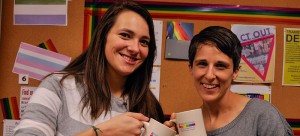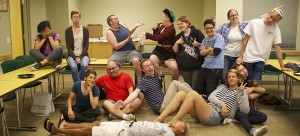
Arriving to a college campus for the first time can be an overwhelming experience for most freshmen. Adjusting to roommates, hectic class schedules, and getting involved in organizations on campus are only just a few challenges. For a gay, lesbian, or transgender student, the process of transitioning to college can be even more daunting due to minimal support available LGBT students.
According to “2010 State of Higher Education for LGBT People,” a study created by non-profit organization Campus Pride, only seven percent of colleges across the country have resources for LGBT students. The study also reports higher rates of depression and suicide amongst these individuals.
To combat this issue, LGBTQA Student Services is piloting a new initiative called the Queer Peers mentor program this year. Targeted towards newly enrolled or newly out students, this program aims to foster a mentee/mentor relationship for the duration of the academic year. Mentors will have monthly meetings with their mentees, as well as attend campus events together and provide social support for them.
The main goal of the Queer Peers mentor program is to go beyond the scope of a regular student organization. Often times, students are unable to participate in student organization meetings because of distance or time conflicts. Since mentors in this program are responsible for coordinating meetings with their mentees, the added flexibility eliminates the intimidation that a newly out mentee may feel in a large group setting.
Katy Weseman, LGBTQA Student Services coordinator, helped pioneer the Queer Peers mentor program by taking into the consideration the many facets of being a college student with marginalized identities.
“There’s a lot of literature out there that says mentorship and direct support can help students in feeling acclimated to a university environment,”Weseman said. “Also, the program will help students feel connected so that they are more likely to do well in school. We are trying to help students be their whole selves and their best selves.”
Having a campus climate that supports LGBTQ identities is critical to a student’s success during college. “2010: The State of Higher Education for LGBTQ Students” also reports that LGBTQ students were significantly more likely to experience harassment than their heterosexual counterparts during college.
Though DePaul is a Catholic institution, which may create discomfort for some LGBTQ individuals, several efforts have been made to make gay, lesbian, and transgender students feel more included on campus. In addition to having the Office of LGBTQA Student Services located on the third floor of the Student Center in Lincoln Park, DePaul also became the first Catholic school in the nation to offer a minor in LGBTQ Studies in 2004. The Queer Peers Mentor Program will serve as another resource that LGBTQ students can take advantage of at DePaul.

“The primary outcome is just hoping to develop community and help LGBTQ students feel supported,” Weseman said. “No matter how you identify, we want everyone to feel like they can learn about these communities and feel well equipped to support others. This program will benefit both mentees and mentors in that way.”
Brandon Jordan, DePaul senior and Queer Peers Mentor, has already begun to feel the impact he is making on helping students with marginalized identities feel comfortable at DePaul.
“When I was discovering who I was, I didn’t have anyone here to support me,” Jordan said. “I want to make sure that doesn’t happen to anyone else.”
Having interned at the Broadway Youth Center, a community organization that serves as a safe space for LGBTQ individuals experiencing housing instability, Jordan feels the knowledge he learned there helped prepare him to support his mentees.
“For me it will be a lot of personal growth and a lot of re-self discovery as a mentor,” Jordan said. “I often bring up my past to help my mentee understand that they are not alone. It also lets me reflect on what I could’ve done differently.”
Ashley Valentin, DePaul senior, helped develop the program with Weseman last year after expressing interest in a leadership opportunity. Her involvement with the program, which includes setting up mentor and mentee parings as well as coordinating meetings, also intertwines with the responsibility Valentin has working as an office assistant for LGBTQA Student Services.
“I chose to get involved with this program because it was more student-oriented, which is something LGBTQA Student Services hasn’t really done in the past,” Valentin said. “I specifically like the one-on-one aspect of it. It’s essentially direct contact from our office to the student.”
Involvement with the Queer Peers Mentor Program has been successful thus far as all 14 trained mentors have all been paired with one or more mentees. Plans for a future partnership with the student group SAGA (Sexual and Gender Alliance) at Lincoln Park High School are also being developed. LGBTQA Student Services will continue to accept mentee applications on a rolling basis.

